Tajik Scientist’s Book on Samanids’ State Language Published in Germany
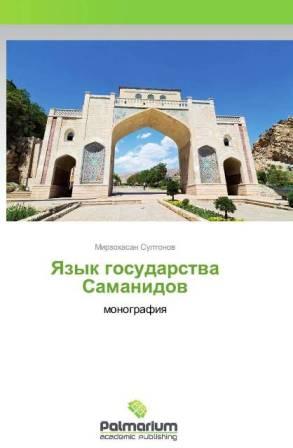
DUSHANBE, 16.03.2020. (NIAT Khovar) – The new book of the Tajik poet and scientist, Doctor of Philology, corresponding member of Academy of Sciences, Academician of the Russian Academy of the Natural Sciences Hassan Sulton (Mirzohassan Sultonov) entitled ‘The Language of the Samanids’ State’ is published in the German Palmarium academic publishing.
The book’s introduction notes that President Emomali Rahmon highly appreciated a momentous role of the Samanids’ period in formation of our nation, language and culture.
According to Emomali Rahmon, thanks to the Samanids’ period the literature and culture have acquired universal importance and graceful Tajik-Persian language as the valuable pearl sparkles during the subsequent history and to date, presenting to a human civilisation outstanding stars of world culture and science. Known scientists, like Sadriddin Aini, Said Nafisi, Bobojon Ghafurov and Yevgeny Bertels repeatedly stated that if wise and educated Samanids were not on political and state arena, today the territory of Tajiks and Persian-speaking people of the world would become the country of race and language of foreigners, and our world-famous literature and culture would liken to unblown, but to already faded flower-bud. Therefore, one can with absolute suretyship say that the Samanids paid special attention to science and culture, Tajik language and poetry, and these factors have allowed to provide existence of the nation and its development.
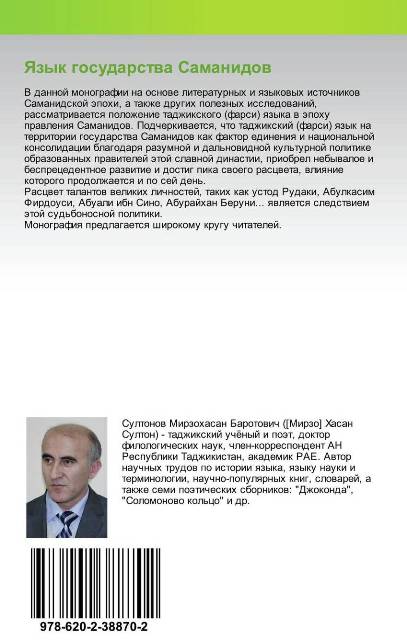 In this connection, the book reads that the Samanids’ State (875-999) with its short, but undying glory is considered the most bright period in political history and culture of the Tajik people. The literated masters of this famous dynasty, being fair, magnanimous and educated people, have developed praiseworthy activity on revival, development and prosperity of the Tajik language.
In this connection, the book reads that the Samanids’ State (875-999) with its short, but undying glory is considered the most bright period in political history and culture of the Tajik people. The literated masters of this famous dynasty, being fair, magnanimous and educated people, have developed praiseworthy activity on revival, development and prosperity of the Tajik language.
Expressive and melodious Tajik language actually is first element of existence of the Tajik nation and national state which in life-changing days of the state independence encourages us to render a tribute to glorious past, to creation of present and promising future.
The book consists of following sections: Tajik (Farsi) language before the Samanids governing, The Samanids and Tajik (Farsi) language prosperity, Distinguished samples of poetic and prose language of the Samanids’ epoch, Ustod Rudaki — the phenomenal development of language and literature of the Samanids period, Hakim Firdavsi and national epos prosperity and Abu Ali ibn Sina and Aburaihon Beruni — great masters of scientific language.
According to the author, summary of research of the Samanids’ State language lead to the following:
1. Ancient Tajik language which throughout long history was mentioned as Porsi or Farsi, Porsii Dari, Porsii Darii Rohi Rost… is the most important element of formation and the most substantial evidence of origin of the Tajik Nation which roots in the Tahirids, Saffarids and the Samanids times and even during early times before occurrence of these local dynasties.
2. From the presented to consideration remained language samples of local dynasties rule of the Tahirids and Saffarids it is seen what even after the Arabic conquest, our native language could keep the authenticity, and influence of the Arabian language is limited only to introduction of some Arabic words and phrases, not effecting phonetic and grammatical structure of our language. It is safe to say that poets of the Tahirids’ and Saffarids’ dynasty rule (Abuhafs Sughdii Samarqandi, Abuabbos Marvazi, Mahmud Varroq Khiravi, Khanzala Bodgisi, Muhammad ibn Vasif Sagzi, Bassom Kurd Horiji, Muhammad ibn Mukhallad, Firuz Mashiqi, Abusulaik Gurgani and Ma’sudi Marvazi) provided survival and stability of our native language by their poetry, and have created favorable conditions for its prosperity in period of the Samanids’ dynasty.
3. Owing to cultural policy of noble Samanid emirs, in particular Ismoil Somoni, Nasr ibn Ahmad and others, our native language as the factor of national unity and solidarity, has received powerful development and reached peak of the blossoming.
4. Advocacy and auspices of Samanid emirs and wazirs and other renowns of this dynasty, servants of language and literature, writing on our native language, have kindly affected and have opened road for occurrence of some great poets and writers, such as Ustod Rudaki, Shahid Balkhi, Abushukur Balkhi, Farolovi, Daqiqi, Firdavsi, Kisoi Marvazi, Munjik Tirmizi, Robiya Balkhi, Bashshor Margazi, Abutaiib Mus’abi… and works of such invaluable poetic products, as “Kalila va Dimna”, “Sinbodnoma” by Rudaki, “Gushtospnoma” by Daqiqi, “Shohnoma” by Firdavsi, “Donishnoma” by Maysari… and prosaic works (“Shohnoma” by Abumansuri, “Ajoib-al-buldon” and “Garshospnoma” by Abulmuayad Balkhi, translation of “Kalila va Dimna” by Abufazl Bal’ami, translation of “Ta’rikhi tabari” or “Ta’rikhi Bal’ami” by Abuali Bal’ami, “Hudud-al-olam”, “Kashf-il-mahjub” by Abuyaqub Sidjistani, “Hidojat-al-mutaallimin fi tib(b)” by Ahmad Ahavajni Buhoroi, “Al-Abnija un haqaiq-al-adviya” by Muvaffaq Hiravi and so on).
5. The Samanids emirs’ initiatives in creation of religious works (“As-savod-al-a’zam”) and translation of comments to the Koran (“Tarjumai Tafsiri Tabari”, “Tafsiri Kur’oni pok” or “Tafsiri pok”, “Tafsiri Kur’oni majid”…) into our native language have created favorable conditions for reception of recognition by Shariat of our language and recognition it as a second language in the Islamic world.
6. Monumental efforts of Samanids’ wiser, their love to culture and language diffusion, like Abufazl Bal’ami and his son Abuali Bal’ami, Abutaiib Mus’abi, Abulhusain Utbi, etc., are high spot in history of our national culture and language, and the next centuries the wisers of other governors, Nizomulmulk, Mir Alisher Navoi, etc. followed their steps.
7. The greatest poet of the Samanids’period Ustod Rudaki, who by his fine instructive verses not only has acquainted the world with brilliant possibilities of our native language, but also has monumentalized the name of this dynasty in world history:
Зи шоир зинда мемонад ба гетӣ ном шоҳонро,
Фурўғ аз Рўдакӣ дорад чароғи дудаи Сомон.
(Owing to poet the kings name will remain in the world,
Only thanks to Rudaki the name of Samanids’ dynasty still alive.)
8. Creation of immortal work of “Shohnoma” by Firdavsi, which begun in Samanids’ period, is considered the peak of development of the national epos. This masterpiece is the unique treasure storing in not only original Tajik words and terms, but also reflecting unique power and possibilities of our native language.
9. Abu Ali ibn Sino and Aburaihon Biruni, who were born and have received education in Samanids’ period, by creation of such masterpieces as “Donishnoma Alai” and “Kitob-ut-tafhim” have proved that our native language having the old past and ability to express exact scientific concepts, and also achievements of level of scientific language, has sufficient and indescribable possibilities in the arsenal.
As a whole, one may state that the Samanids’, respecting and appreciating the native language, not only have inhaled a new life in our language and our ancient nation, but by wise cultural policy have again revived our ancient customs and traditional holidays at the state level and for centuries have provided existence of national Iranian and Aryan spirit.
Hereby, our native language owing to efforts noble Samanids’ emirs and wisers has reached its perfection, and after collapse of this dynasty has successfully stood tests of times during next centuries and kept the originality and power. And now in the epoch of globalisation with dignity it can protect the authenticity and silver tongue due to efforts of its real sons, and leave the worthy inheritance to the future generations.
The book is provided for high readership.
It is worth to note that the scientific works and articles of this Tajik scientist are published in the US, Russia, Germany, France, Spain, Poland, Iran, Mauritius and others.










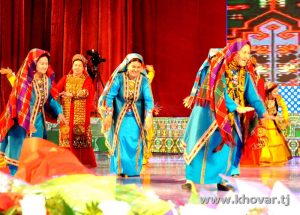 Days of Culture of Turkmenistan Will Begin in Tajikistan Tomorrow
Days of Culture of Turkmenistan Will Begin in Tajikistan Tomorrow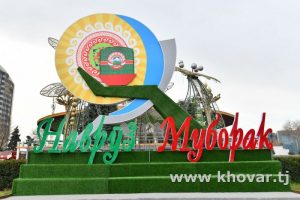 Head of State Compares the Importance and Role of the Tajik Language and Navruz
Head of State Compares the Importance and Role of the Tajik Language and Navruz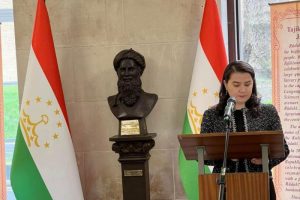 Bust of Abuabdullo Rudaki Unveiled in London
Bust of Abuabdullo Rudaki Unveiled in London Tajik Physicists Undergo Training in Japan
Tajik Physicists Undergo Training in Japan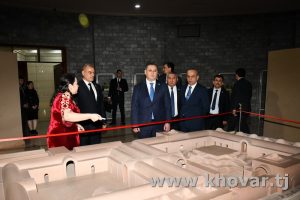 Deputy Prime Minister — Minister of Foreign Affairs of Kazakhstan Gets Acquainted with the Ancient History and Culture of the Tajik People
Deputy Prime Minister — Minister of Foreign Affairs of Kazakhstan Gets Acquainted with the Ancient History and Culture of the Tajik People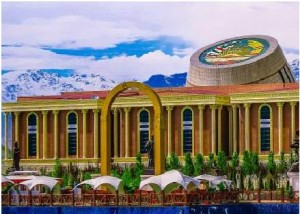 National Museum of Tajikistan and the Qatar Museums Strengthen Cooperation
National Museum of Tajikistan and the Qatar Museums Strengthen Cooperation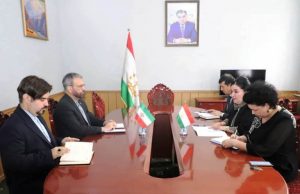 Tajikistan and Iran Strengthen Cultural Cooperation
Tajikistan and Iran Strengthen Cultural Cooperation «Zol and Rudoba» Play Will Take Part in the 42nd Fajr International Film Festival in Iran
«Zol and Rudoba» Play Will Take Part in the 42nd Fajr International Film Festival in Iran Representatives of the Ministry of Culture of the State of Qatar visited the National Museum of Tajikistan
Representatives of the Ministry of Culture of the State of Qatar visited the National Museum of Tajikistan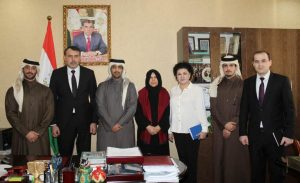 Qatar Culture Week Is Planned To Be Held in Tajikistan in 2024
Qatar Culture Week Is Planned To Be Held in Tajikistan in 2024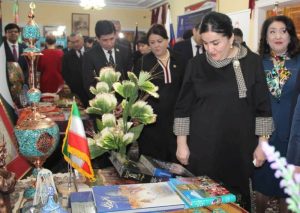 Dushanbe Hosts East-West International Festival on Eurasian Folk Crafts
Dushanbe Hosts East-West International Festival on Eurasian Folk Crafts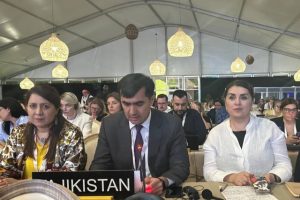 Tajikistan`s Nomination «Traditions of Atlas and Adras Weaving» Inscribed on the UNESCO Representative List of Intangible Cultural Heritage of Humanity
Tajikistan`s Nomination «Traditions of Atlas and Adras Weaving» Inscribed on the UNESCO Representative List of Intangible Cultural Heritage of Humanity













